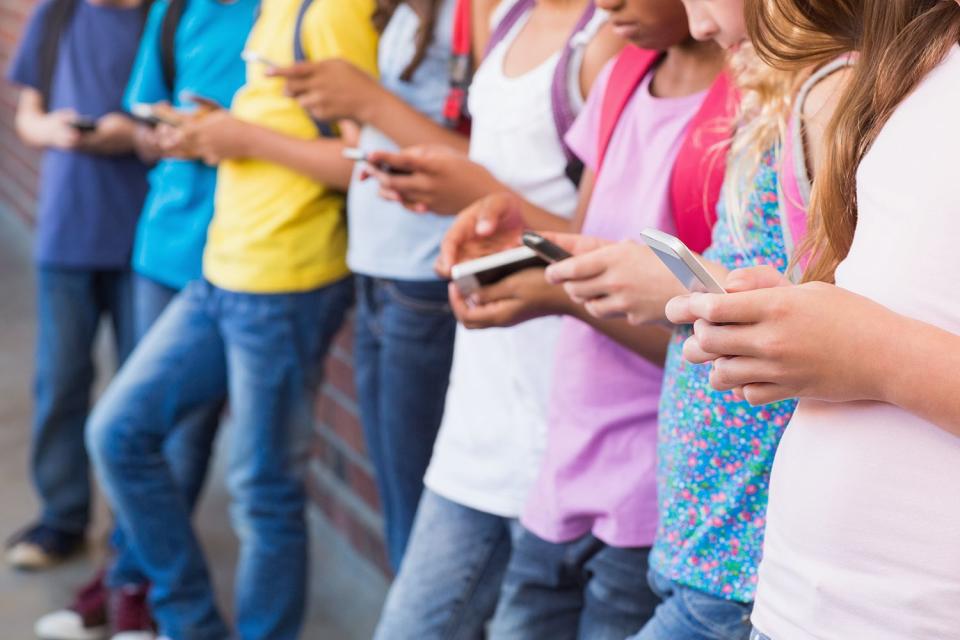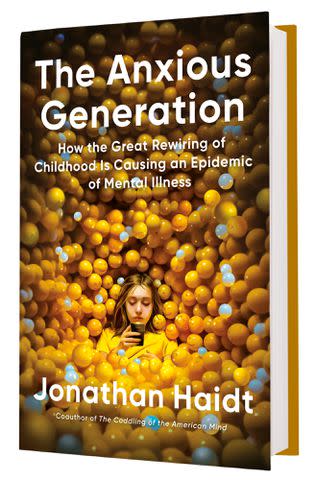How Smartphones Are Hurting Our Kids’ Mental Health: ‘There’s Massive Evidence of Harm‘ (Exclusive)
In his new book 'The Anxious Generation,' NYU social psychologist Jonathan Haidt argues phone use is a primary cause behind the youth mental health crisis

Getty
Stock photo of teens with cell phonesWhen NYU social psychologist Jonathan Haidt looks at the charts tracking teen mental health, he
sees an undeniable truth. Beginning in 2012, five years after the introduction of the iPhone and two
years after Instagram debuted, “anxiety and depressive disorders go up with a sharp increase,” he says. Since then, nearly half of all teens say they are online 'almost constantly' (double the figure in 2015) and incidents of self-harm and suicide rates among teens have more than doubled.
“We've never seen anything like this. There's massive evidence of harm," Haidt says. "It happened in many countries at the same time, at a specific point in time: the moment when teens traded their flip phones for smartphones. It’s as if you had a murder, and all eyewitnesses point to this suspect. There is no other explanation."
In his latest book The Anxious Generation: How the Great Rewiring of Childhood is Causing an Epidemic of Mental Illness, out now, Haidt examines the connection between this “great rewiring,” in which we've traded kids' play time for phone time, and the decline in teen mental health. Haidt talked with PEOPLE for a story in this week's issue—and offered suggestions on how to solve the problem.

Penguin Press
The Anxious Generation by Jonathan HaditWhat’s the connection between smartphones and kids’ mental health?
Imagine there was suddenly a toy introduced which would cause children to get less sleep, less exercise, spend less time with other children. It would make them incredibly self-conscious, and it would lower their self-esteem and cause depression and anxiety. That would be horrible, right? We’ve seen a loss of the play-based childhood, which kids have always had, in favor of a phone-based childhood. Five years ago it was possible to say the link between mental health and smartphones is just correlational, but that’s not true anymore. All evidence points to it.
Is the problem entirely about smartphones?
Parenting became more intense in the United States, and in other English-speaking countries, in the nineties. Parents now spend a lot of time with kids, supervising them, training them, trying to get them ready for college. That may help them get into college, but it's going to make them less capable, confident, and happy once they get there. Play is the work of childhood. Kids must play a lot in order to develop their brains. And it's best when they play unsupervised. If there's an adult nearby, the adult is likely to come intervene if there's a conflict. But the conflicts are the best part. Kids need conflicts in order to work out negotiation skills.
Why is online communication inferior to real life?
You’re giving them an experience blocker. The way you interact on social media is nothing like face-to-face. Emojis don’t substitute for real smiles or laughter. And on social media, interactions are asynchronous. You say something, and you wait and worry: “Why didn’t she respond?” When two friends talk in real life or by phone, there’s no anxiety; they’re connecting. Real connection is bonding, not performative. On a social platform, you perform to the world, and there’s constant social comparison.
What needs to change?
If Congress said, “You have to be 21 to drink, but we’re going to give immunity to the alcohol industry — it’s the parents’ job to keep their children out of bars,” that’s the situation we’re in with social media. It’s absurd. Parents can’t possibly do that. The most important thing the government can do is raise the age for social media use to 16. Right now, the law says 13, and there's no enforcement. Once kids are on, there’s no way to make it safe. Social media is brutal for children. It’s crucial to require social media companies to age verify. If companies were responsible for harms to underage users, they’d solve the problem quickly.
“We’ve overprotected our children in the real world and underprotected them online,”
Jonathan Haidt

Jayne Riew
NYU social psychologist Jonathan Haidt, author of The Anxious Generation
What can be done now?
Schools should be phone-free — that’s a no-brainer. Imagine if we could give kids seven hours a day to free them from the need to keep up. And the Internet is not going to have guardrails soon, so it’s incumbent on parents to delay the day our kids have 24/7 access to the Internet, at least through middle school. That’s when the maximum damage is done. Middle schoolers don’t need their own smartphone. Give them a flip phone. Kids also need more independence, free play and responsibility in the real world. We're doing them no favors by overprotecting them there. Everyone's worried about phones, but there's a lot we have to do on the play side. I co-founded an organization called Let Grow with Lenore Skenazy, who wrote this amazing book, Free Range Kids, to encourage more of that.
Related: Erin Napier on Creating Community to Support Her Kids' 'Low-Tech' Upbringing: They 'Deserve More'
Telling your kid they can only have a flip phone can be a tough call if your kids’ friends all have smartphones!
Collective action is essential, and early action is most effective. For anybody with children under 10, link up now with parents of your kids’ friends. Believe me, they’re worried about this too. Coordinate—your kids aren’t going to get phones, but they are going to get a lot of time playing with each other. So it’s not “Let’s take away phones.”
Related: Pink Says She Won't Allow Her Daughter Willow, 10, to Have a Cell Phone: 'I'm Not There Yet'
Is it too late for kids who have grown up with smartphones?
It's definitely not too late. They're still young, they can still change. I'm getting amazing results from the students in my "Flourishing" class at NYU. They're all 19 plus or minus a year. They're all addicted to their phones. We go through exercises to help them regain control of their attention and I work a lot with them on their morning and evening routines. Once they understand what this is doing to them and that they need to guard their attention like it's the most precious resource, they get amazing results. They lower their screen time. They find that they can do their homework. They're not interrupted constantly. So some simple lifestyle changes can bring about huge benefits, especially if they do it together, that's the key thing. And there's nobody out there in Gen Z saying, "We need our social media, don't take it away from us." They're saying, "I wish we lived in a world with no social media." A real strength of Gen Z is that they're not in denial, they're not defensive. They see what this is doing to them. If we can help them find a way out of this trap, they're going to take it.
For more from Jonathan Haidt, pick up the latest issue of PEOPLE, on newsstands Friday, or subscribe here.
For more People news, make sure to sign up for our newsletter!
Read the original article on People.

 Yahoo Lifestyle
Yahoo Lifestyle 
